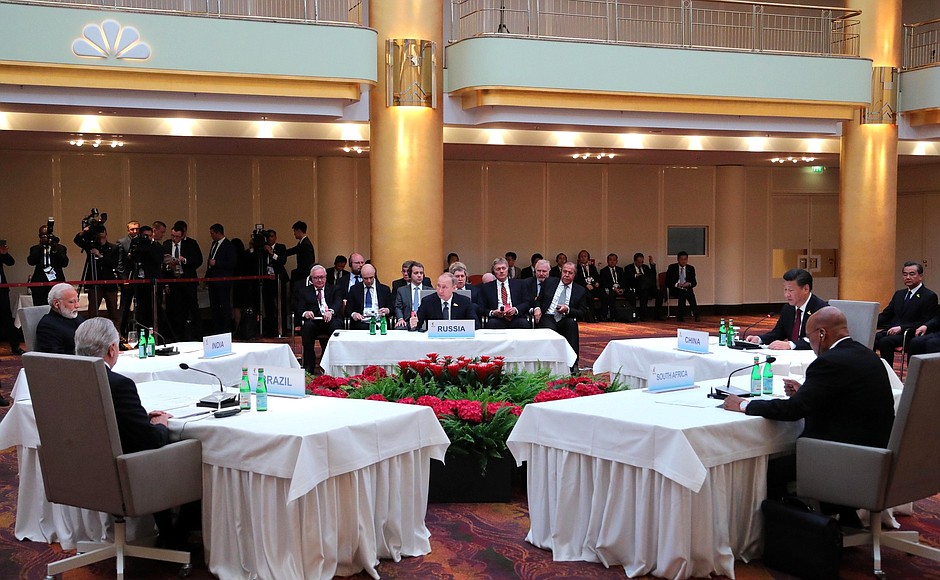July 7, 2017
11:15
Hamburg

Informal meeting of BRICS heads of state and government. Photo: RIA Novosti
Before the start of the G20 Summit in Hamburg, an informal meeting took place between the heads of state and government of the BRICS countries (Brazil, Russia, India, China and South Africa).
Following the meeting, the BRICS leaders issued a joint press communique.
July 7, 2017
We, the BRICS Leaders, met on the margins of the G20 Summit in Hamburg, Germany on 7 July 2017.
We recognize that global economic growth is gathering pace, though the downside risks persist. BRICS countries and other Emerging Markets and Developing Countries (EMDCs) continue to be the main engine of global growth. Facing uncertainties in the world economy, major economies should enhance macroeconomic policy coordination and avoid negative spillovers to emerging market economies.
We affirm our support to the G20 German Presidency for a successful hosting of the Hamburg G20 Summit. We resolve to use all policy tools – fiscal, monetary and structural – to enhance resilience and potentials of emerging markets, and foster strong, sustainable, balanced and inclusive growth.
We stress the importance of upholding a more inclusive, balanced, and open world economy, creating an enabling environment for the development of EMDCs, encouraging human resource development and increasing people-to-people links, so that the benefits of globalization can be shared equally by all countries and peoples.
We firmly support a rules-based, transparent, non-discriminatory, open and inclusive multilateral trading system, implementation and enforcement of existing WTO rules and commitments and oppose protectionism. We will strive to improve the current framework and functioning of the multilateral trading system. We call for the acceleration of the implementation of the Bali and Nairobi MCM outcomes and for the WTO Ministerial Conference to be held this year in Argentina to produce positive outcomes.
In order to support global economic growth and make our financial systems more resilient to any potential systemic crises, we are committed to making global financial architecture more effective and reflective of the current global economic landscape. In this regard, we stress the importance of increasing the voice and representation of EMDCs in global economic and financial institutions, and of the completion of the new round of reforms of the IMF and the World Bank as scheduled. We welcome the contribution of the New Development Bank and the Contingent Reserve Arrangement to international financial stability and sustainable development.
We commit ourselves and call upon the international community to make further efforts in implementing the 2030 Agenda for Sustainable Development and attaining its Goals in a timely manner with an equal and balanced emphasis on its economic, social and environmental dimensions. Education and research are important in reaching the SDGs. We believe education improves global economic environment and promotes innovation and adoption of technologies, accelerates job creation and moves economies towards more diversified and value adding industries.
We urge developed countries to honor their Official Development Assistance commitments and help developing countries improve their development capabilities and achieve the SDGs by 2030.
We recognize the importance of research and technology collaboration in stimulating world economic growth and encourage the contributions of research initiatives to the development of economic sector. Promotion of innovation is important for sustainable growth and provides a strong and sustainable contribution to the world economy. We emphasize the importance of implementing the G20 commitments in this regard.
We call upon the international community to jointly work towards implementation of the Paris Agreement on Climate Change according to the principles of the United Nations Framework Convention on Climate Change (UNFCCC), including the principles of equity and common but differentiated responsibilities and respective capabilities, in the light of different national circumstances, and to fulfill commitments to provide financial and technical support to developing countries in meeting their climate challenges.
We commit to take stock of our cooperation experiences and to build upon existing agreements, including the Strategy for BRICS Economic Partnership, and look forward to further enhancing BRICS strategic partnership in all priority areas of cooperation.
We express appreciation and voice full support for China’s BRICS Chairmanship. We look forward to a successful hosting of 9th BRICS Summit in Xiamen under the theme of ”Stronger Partnership for a Brighter Future“.